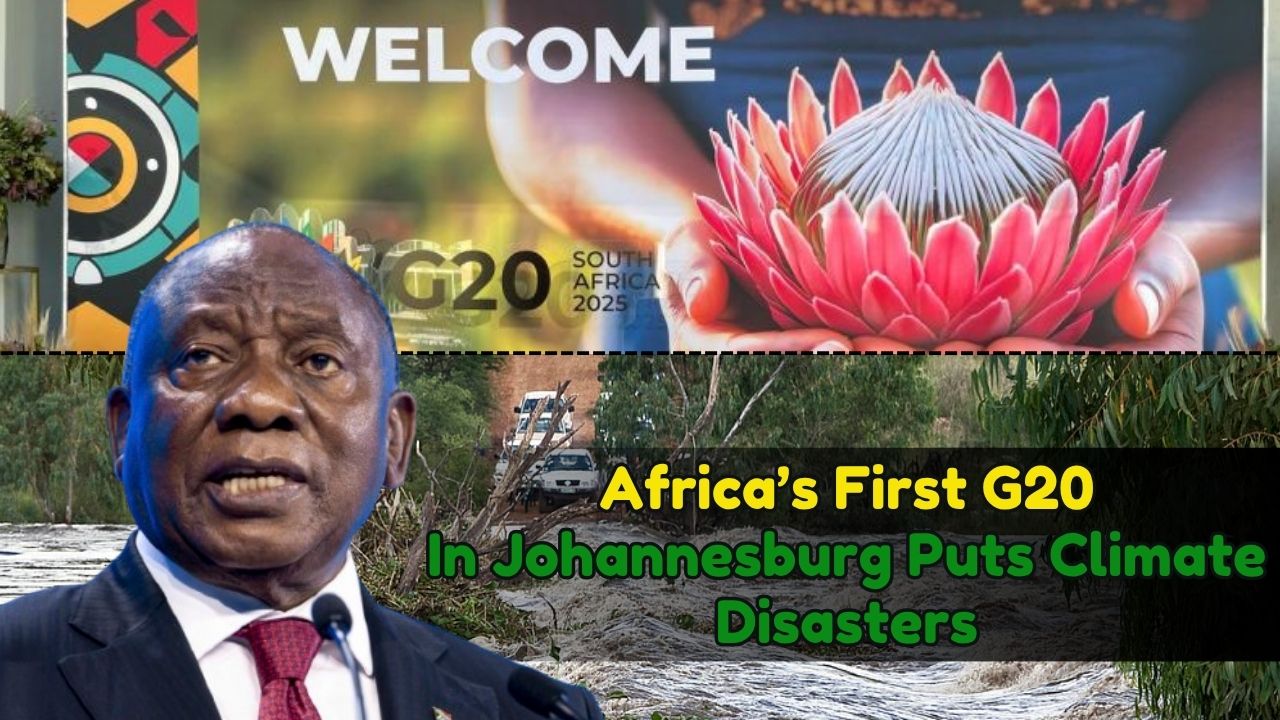For the first time, the G20 leaders summit is being held on African soil, with Johannesburg, South Africa, serving as host. The country is using this historic moment to highlight the urgent reality of climate change in poorer nations and to push wealthier countries for stronger commitments, faster climate financing, and practical support for communities that are already suffering from rising temperatures, droughts, and devastating storms.
The situation in places like Alexandra township in Johannesburg shows exactly why the issue cannot wait. Volunteers regularly jump into the polluted Jukskei River to clear garbage nets damaged by heavy rains so that the township does not face severe flooding. For millions across Africa and the developing world, climate disasters are no longer predictions. They are daily life.
Why This G20 Summit Matters For Africa

South Africa chose to put climate action, global inequality, and developing-country needs at the heart of its G20 presidency. Hosting the summit in Johannesburg symbolizes a shift in global leadership, giving Africa a louder voice in shaping economic and climate-related decisions that affect billions of lives.
Africa contributes the least to global carbon emissions but suffers some of the harshest consequences. By bringing the world’s most influential economies to Johannesburg, South Africa aims to redirect global attention toward the vulnerabilities of the Global South and the need for real solutions that go beyond statements and promises.
Summary Table
Topic |
Details |
|---|---|
Event |
G20 Leaders Summit in Johannesburg, South Africa |
Key Focus |
Climate financing, disaster response, inequality, development |
South Africa’s Priority |
More support from rich nations for climate adaptation and resilience |
Major Concern |
Increasing climate disasters across poorer countries |
Official G20 Website |
The Climate Reality In Alexandra Township
Alexandra is one of South Africa’s oldest and most densely populated townships. Located near the affluent district of Sandton, it represents one of the most extreme urban contrasts in the world. Yet its challenges are shared by countless communities across the country.
Heavy rains often lead to flooding that submerges bridges and prevents children from reaching school. The Alexandra Water Warriors, a dedicated volunteer group, work tirelessly to reduce the environmental risk. They untangle debris nets in polluted river water, plant native trees to cool the area, and collect recyclable waste.
Their work shows how communities are taking climate resilience into their own hands even when resources are scarce.
Climate Change And Inequality: A Dangerous Connection
Global experts frequently warn that climate change intensifies inequality. Poorer countries with weaker infrastructure, limited savings, and fewer protections are more vulnerable to environmental disasters. When a flood or cyclone hits, the damage often pushes families deeper into poverty and governments further into debt.
Data from past decades shows that natural disasters have increased significantly in low-income nations. Many are now forced to choose between investing in growth or protecting themselves against climate threats. This leaves them trapped in a cycle where every climate shock is followed by deeper social and economic setbacks.
Southern Africa’s Recent Climate Disasters
Southern Africa has experienced repeated climate shocks that have claimed thousands of lives and caused large-scale economic damage.
- Cyclone Idai in 2019 devastated Mozambique, Malawi, and Zimbabwe, causing several billions in damages and overwhelming recovery systems.
- The recent El Nino-induced drought created one of the most severe agricultural crises in years, destroying crops and pushing rural communities to the brink.
- Countries across the region now face growing food insecurity and mounting reconstruction costs every year.
These events demonstrate why African leaders insist that global climate agreements must include stronger financial support and immediate action.
Climate Finance: The Biggest Debate At The G20
Climate finance remains a central point of tension between rich and poor countries. Wealthier nations have pledged to increase climate funding over the coming years, but developing nations argue that the commitments are far from enough.
Independent estimates suggest that developing countries may require close to one trillion dollars a year by 2030 to effectively adapt to climate change, protect vulnerable populations, and implement green development strategies.
South Africa is using the G20 platform to push for:
- Faster access to climate funds
- Larger contributions from major economies
- More support for adaptation, not just emission reduction
- Better mechanisms for disaster response and recovery
The absence of some major countries from the summit makes achieving unanimous decisions more difficult, but South Africa continues to amplify the urgency of the issue.
South Africa’s Domestic Struggles With Inequality
While South Africa advocates globally for developing nations, it also faces substantial internal challenges. The country has some of the world’s highest inequality levels, with millions living in informal settlements that lack proper housing, sanitation, and safe infrastructure.
Many of these settlements are built in low-lying areas that are prone to flooding. When storms hit, poorly built homes collapse and drainage systems fail, making disasters more deadly than they should be.
The June floods in the Eastern Cape that killed over 100 people highlight the consequences of poor housing conditions combined with intensified weather patterns.
Community Resilience And Green Job Opportunities
Despite the challenges, South Africa is building inspiring models of community-driven climate resilience. The Alexandra Water Warriors are part of a broader environmental initiative involving around 3,000 people who receive stipends for participating in local green projects.
What began with 250 volunteers in 2022 has grown significantly, creating a network of climate stewards who help:
- Restore local ecosystems
- Reduce urban heat
- Protect rivers and wetlands
- Support education and awareness
These efforts show that climate action can create jobs, strengthen communities, and contribute to more resilient economies.
Experts also point out that green and sustainable growth tends to be faster and more stable than traditional development paths. Investments in climate resilience can reduce long-term costs, lower disaster risks, and create new economic opportunities.
What Africa Wants From The G20 Summit
African leaders, civil society groups, and climate advocates are aligned in their demands:
- Larger and more reliable climate finance commitments
- Faster disbursement of funds for disaster-hit regions
- Support for climate-resilient infrastructure and agriculture
- Fairer global debt systems that allow countries to rebuild without sinking deeper into crisis
- Recognition of Africa’s climate challenges and development needs
For millions living in vulnerable areas, the Johannesburg G20 summit is more than a diplomatic meeting. It is a chance to secure real action on climate change and global inequality.
Frequently Asked Questions (FAQs)
1. Why is the G20 summit in Johannesburg significant?
Because it is the first time the G20 leaders summit is being held on African soil, highlighting the continent’s growing role in global decision-making.
2. How is climate change affecting South African communities?
Heavy rains, floods, droughts, and rising temperatures are worsening living conditions, especially in informal settlements that lack strong infrastructure.
3. What is climate finance and why is it important?
Climate finance refers to funding provided to developing countries to help them adapt to climate impacts, build resilience, and transition to greener economies. It is essential for protecting vulnerable populations.
4. What are Africa’s main demands at the G20 summit?
Africa is calling for more climate funding, debt relief, support for adaptation measures, and fairer global economic policies.
5. Where can I find official updates about the G20 summit?
You can visit the official G20 website at https://g20.org for news, documents, and event details.
For More Information Click HERE











